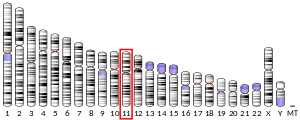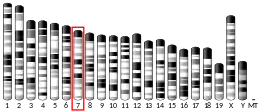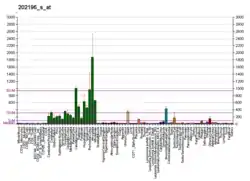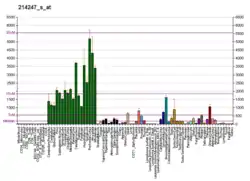Dickkopf-related protein 3 is a protein in the Dickkopf family that in humans is encoded by the DKK3 gene.[5][6]
This gene encodes a protein that is a member of the dickkopf family. The secreted protein contains two cysteine rich regions and is involved in embryonic development through its interactions with the Wnt signaling pathway. The expression of this gene is decreased in a variety of cancer cell lines and it may function as a tumor suppressor gene. Alternative splicing results in multiple transcript variants encoding the same protein.[6]
References
- 1 2 3 GRCh38: Ensembl release 89: ENSG00000050165 - Ensembl, May 2017
- 1 2 3 GRCm38: Ensembl release 89: ENSMUSG00000030772 - Ensembl, May 2017
- ↑ "Human PubMed Reference:". National Center for Biotechnology Information, U.S. National Library of Medicine.
- ↑ "Mouse PubMed Reference:". National Center for Biotechnology Information, U.S. National Library of Medicine.
- ↑ Krupnik VE, Sharp JD, Jiang C, Robison K, Chickering TW, Amaravadi L, et al. (October 1999). "Functional and structural diversity of the human Dickkopf gene family". Gene. 238 (2): 301–13. doi:10.1016/S0378-1119(99)00365-0. PMID 10570958.
- 1 2 "Entrez Gene: DKK3 dickkopf homolog 3 (Xenopus laevis)".
Further reading
- Maruyama K, Sugano S (January 1994). "Oligo-capping: a simple method to replace the cap structure of eukaryotic mRNAs with oligoribonucleotides". Gene. 138 (1–2): 171–4. doi:10.1016/0378-1119(94)90802-8. PMID 8125298.
- Andersson B, Wentland MA, Ricafrente JY, Liu W, Gibbs RA (April 1996). "A "double adaptor" method for improved shotgun library construction". Analytical Biochemistry. 236 (1): 107–13. doi:10.1006/abio.1996.0138. PMID 8619474.
- Yu W, Andersson B, Worley KC, Muzny DM, Ding Y, Liu W, et al. (April 1997). "Large-scale concatenation cDNA sequencing". Genome Research. 7 (4): 353–8. doi:10.1101/gr.7.4.353. PMC 139146. PMID 9110174.
- Suzuki Y, Yoshitomo-Nakagawa K, Maruyama K, Suyama A, Sugano S (October 1997). "Construction and characterization of a full length-enriched and a 5'-end-enriched cDNA library". Gene. 200 (1–2): 149–56. doi:10.1016/S0378-1119(97)00411-3. PMID 9373149.
- Tsuji T, Miyazaki M, Sakaguchi M, Inoue Y, Namba M (February 2000). "A REIC gene shows down-regulation in human immortalized cells and human tumor-derived cell lines". Biochemical and Biophysical Research Communications. 268 (1): 20–4. doi:10.1006/bbrc.1999.2067. PMID 10652205.
- Kobayashi K, Ouchida M, Tsuji T, Hanafusa H, Miyazaki M, Namba M, et al. (January 2002). "Reduced expression of the REIC/Dkk-3 gene by promoter-hypermethylation in human tumor cells". Gene. 282 (1–2): 151–8. doi:10.1016/S0378-1119(01)00838-1. PMID 11814687.
- Mao B, Niehrs C (January 2003). "Kremen2 modulates Dickkopf2 activity during Wnt/LRP6 signaling". Gene. 302 (1–2): 179–83. doi:10.1016/S0378-1119(02)01106-X. PMID 12527209.
- Kurose K, Sakaguchi M, Nasu Y, Ebara S, Kaku H, Kariyama R, et al. (March 2004). "Decreased expression of REIC/Dkk-3 in human renal clear cell carcinoma". The Journal of Urology. 171 (3): 1314–8. doi:10.1097/01.ju.0000101047.64379.d4. PMID 14767340.
- Hoang BH, Kubo T, Healey JH, Yang R, Nathan SS, Kolb EA, et al. (April 2004). "Dickkopf 3 inhibits invasion and motility of Saos-2 osteosarcoma cells by modulating the Wnt-beta-catenin pathway". Cancer Research. 64 (8): 2734–9. doi:10.1158/0008-5472.CAN-03-1952. PMID 15087387.
- Roman-Gomez J, Jimenez-Velasco A, Agirre X, Castillejo JA, Navarro G, Barrios M, et al. (August 2004). "Transcriptional silencing of the Dickkopfs-3 (Dkk-3) gene by CpG hypermethylation in acute lymphoblastic leukaemia". British Journal of Cancer. 91 (4): 707–13. doi:10.1038/sj.bjc.6602008. PMC 2364778. PMID 15226763.
- Zhang Z, Henzel WJ (October 2004). "Signal peptide prediction based on analysis of experimentally verified cleavage sites". Protein Science. 13 (10): 2819–24. doi:10.1110/ps.04682504. PMC 2286551. PMID 15340161.
- Hsieh SY, Hsieh PS, Chiu CT, Chen WY (December 2004). "Dickkopf-3/REIC functions as a suppressor gene of tumor growth". Oncogene. 23 (57): 9183–9. doi:10.1038/sj.onc.1208138. PMID 15516983. S2CID 10188362.
- Ftouh S, Akbar MT, Hirsch SR, de Belleroche JS (July 2005). "Down-regulation of Dickkopf 3, a regulator of the Wnt signalling pathway, in elderly schizophrenic subjects". Journal of Neurochemistry. 94 (2): 520–30. doi:10.1111/j.1471-4159.2005.03239.x. PMID 15998302. S2CID 679696.
- Kuphal S, Lodermeyer S, Bataille F, Schuierer M, Hoang BH, Bosserhoff AK (August 2006). "Expression of Dickkopf genes is strongly reduced in malignant melanoma". Oncogene. 25 (36): 5027–36. doi:10.1038/sj.onc.1209508. PMID 16568085. S2CID 12065588.
- Urakami S, Shiina H, Enokida H, Kawakami T, Kawamoto K, Hirata H, et al. (April 2006). "Combination analysis of hypermethylated Wnt-antagonist family genes as a novel epigenetic biomarker panel for bladder cancer detection". Clinical Cancer Research. 12 (7 Pt 1): 2109–16. doi:10.1158/1078-0432.CCR-05-2468. PMID 16609023.
- Veeck J, Bektas N, Hartmann A, Kristiansen G, Heindrichs U, Knüchel R, Dahl E (2008). "Wnt signalling in human breast cancer: expression of the putative Wnt inhibitor Dickkopf-3 (DKK3) is frequently suppressed by promoter hypermethylation in mammary tumours". Breast Cancer Research. 10 (5): R82. doi:10.1186/bcr2151. PMC 2614517. PMID 18826564.
- Veeck J, Wild PJ, Fuchs T, Schüffler PJ, Hartmann A, Knüchel R, Dahl E (July 2009). "Prognostic relevance of Wnt-inhibitory factor-1 (WIF1) and Dickkopf-3 (DKK3) promoter methylation in human breast cancer". BMC Cancer. 9: 217. doi:10.1186/1471-2407-9-217. PMC 2717119. PMID 19570204.
This article is issued from Wikipedia. The text is licensed under Creative Commons - Attribution - Sharealike. Additional terms may apply for the media files.





